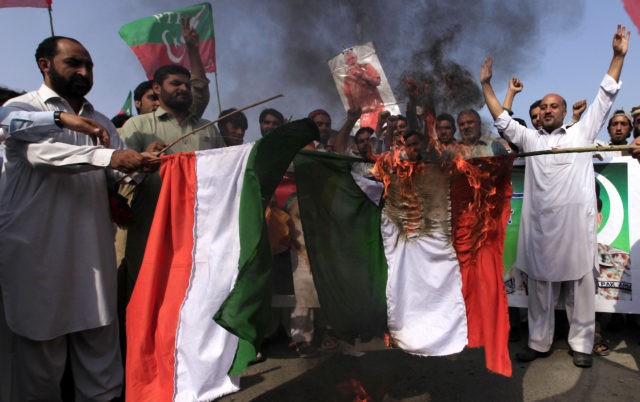Islamabad’s Foreign Office (FO) submitted a dossier to the United Nations containing alleged proof that India is “financing terrorist elements in Pakistan,” declared a spokesman for the FO.
Pakistan’s submission of purported evidence took place Thursday, nearly a week after India urged the UN to “isolate” its regional rival government of Islamabad for refusing to join global efforts against terrorism, adding that identifying Pakistan as a nation who sponsors and exports terror is long overdue.
Besides the United States, Pakistan’s neighbors India and Afghanistan have long accused Islamabad of sheltering terrorists who carry attack across the border in Afghanistan, where U.S. troops are operating, and on Indian soil.
In May 2010, the Obama administration accused the Pakistani Taliban for the attempted car bombing in Times Square, marking the first and only time the group, officially known as Tehrik-e Taliban Pakistan (TTP), attempted to carry an attack on U.S. soil.
Both nuclear-armed neighbors India and Pakistan have been increasingly clashing in recent weeks along the disputed Line of Control (LoC) that divides their portion of the Muslim-majority Himalayan region of Kashmir.
“The dossier handed over to the United Nations contains proof of financing the terrorist elements in Pakistan by India,” Foreign Office Spokesman Nafees Zakariya told reporters in his weekly briefing Thursday, reports The News.
“India has always violated at Line of Control and ceasefire accord,” he also said. “Pakistan had never violated at the LoC.”
“All political parties are united on the issue of Kashmir,” he added and urged the world community to pay attention to human rights violations in the occupied Kashmir.
On Monday, the Russian-led U.N. Security Council (UNSC), considered the most powerful body of the alliance, decided to ignore the growing tensions between India and Pakistan in Kashmir.
The decision comes after U.N. Secretary-General Ban Ki-moon expressed deep concerns over the significant increase in tensions between India and Pakistan in the wake of recent developments in Kashmir, particularly military clashes between the two countries along the border that separates their respective Kashmir regions in violation of the 2003 ceasefire.
“He calls on the Governments of Pakistan and India to address their outstanding issues, including regarding Kashmir, peacefully through diplomacy and dialogue. His good offices are available, if accepted by both sides,” said a spokesman for Ban in a statement issued Sept. 30.
That same day, Maleeha Lodhi, Pakistan’s UN ambassador, pleaded with U.N. secretary-general to intervene in what she referred to as a “dangerous” situation between the two nuclear-armed rivals.
“This is a dangerous moment for the region,” Lodhi said after meeting with Ban at UN headquarters in New York. “The time has come for bold intervention by him if we are to avoid a crisis, because we can see a crisis building up.”
The U.N. chief has reportedly offered to mediate efforts to defuse escalating tensions between India and Pakistan.
On Tuesday, day after the Russian-led U.N. Security Council said it was planning to address the India-Pakistan confrontations over Kashmir, a spokesman for the Office of the U.N. High Commissioner for Human Rights (OHCHR) said the commissioner, “is seriously concerned about the human rights situation in Indian-administered Jammu and Kashmir, as well as the rising tensions between India and Pakistan.”
In public, India and Pakistan have expressed a willingness to defuse the rising tensions. However, both countries accuse one another of provocations that have led to ceasefire violations. They both appear to have preconditions for peace.
While India has long accused Pakistan for providing military assistance and training to rebels and even some terrorists fighting in Kashmir for independence from India or to merge the region with Pakistan, Islamabad has accused India of cracking down on dissent among the Muslim-majority population of Kashmir seeking independence from India or a merger with Pakistan.
About a year ago, Islamabad also accused India of backing terrorist groups, namely the Pakistani Taliban known as Tehrik-e Taliban Pakistan (TTP) in Federally Administered Tribal Areas (FATA) along the Pakistan-Afghanistan border, reported The Hindu.
Meanwhile, India has accused Pakistan of backing terrorist groups such as Lashkar-e-Taiba (LeT).
New Delhi blames Islamabad for helping LeT foment unrest in Kashmir.

COMMENTS
Please let us know if you're having issues with commenting.